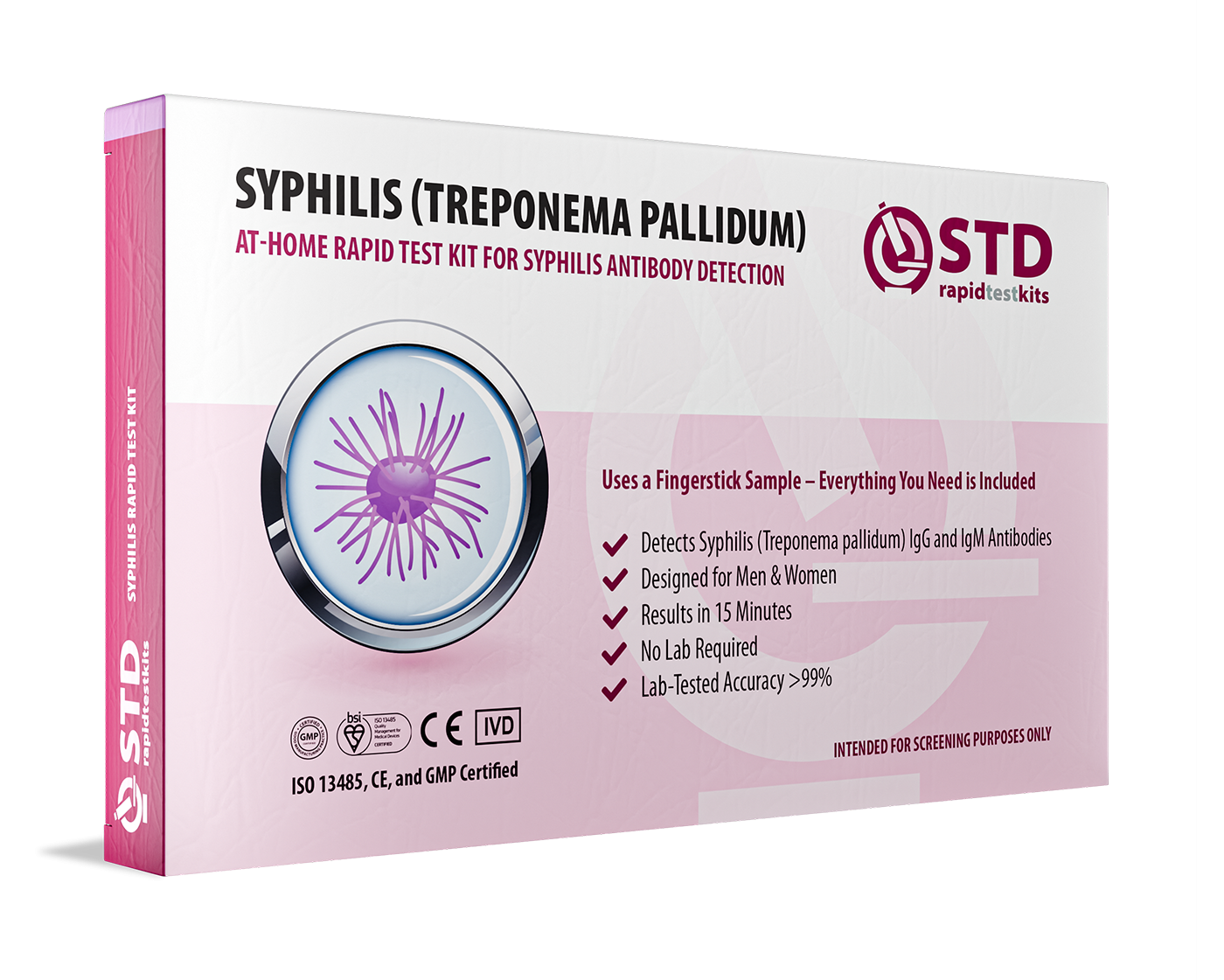When to Get Tested for Trichomoniasis After a Risky Hookup
Quick Answer Box
The 4 phases of syphilis are primary, secondary, latent, and tertiary. The symptoms in each phase vary from a minor sore to death due to organ failure. Antibiotic medication can halt the disease in its tracks with early diagnosis.
The Silent Start: Primary Syphilis
It always begins quietly. For most individuals, the initial symptom of primary syphilis is a single painless sore, a chancre. It is firm, round, and appears wherever the infection entered, genitalia, anus, mouth, or even fingers.
Here's why it's so hazardous: it doesn't ache, it doesn't itch, and it will typically go away by itself within 3 to 6 weeks. And that eradication makes individuals think they're home free. But inside you, Treponema pallidum, the syphilis bacterium, is already on the move.
- Typical symptoms: Painless ulcer, enlargement of lymph nodes near the site
- Timeline: ~3 weeks post exposure, duration of 3–6 weeks
- Transmission risk: Very high, even if no symptoms are visible
Most individuals confuse this phase as a zit, an ingrown hair, or inflammation caused by friction, particularly if it's in a difficult-to-view area such as the vaginal canal, rectum, or tonsils. That is why it gets overlooked so frequently.
"I thought it was only a shaving bump. It went away by itself, and I did not get sick… until months afterward when the rash struck," , "Jules," 28

People are also looking for: How is a syphilis chancre different from a herpes sore?
Rash and Rebellion: Secondary Syphilis
Whereas stage one is stealthy, stage two is a skin uprising. Weeks or months after the chancre disappears, secondary syphilis takes over with bizarre, visible symptoms that individuals frequently disregard, or misdiagnose.
The most typical symptom is a scaly, reddish-brown rash, usually on your palms or soles of your feet. However, it may also appear as eczema, psoriasis, or ringworm. You may also develop mucous patches, fever, fatigue, swollen lymph nodes, hair loss, or wart-like lesions around your genitals or anus (condyloma lata).
- Shared symptoms: Rash, fever, sore throat, swollen glands, patchy hair loss
- Timeline: May appear 6 weeks to 6 months following infection
- Transmission risk: Highly contagious
This stage can persist for several weeks, or recur within the period of a year. The symptoms may resolve on their own, but that doesn't eliminate the infection. It simply goes underground.
Hiding in Plain Sight: Latent Syphilis
Now for the sneakiest stage: nothing. Once the rash and flu-like symptoms go away, syphilis enters its latent stage, a time when you completely have no symptoms whatsoever.
- Symptoms: None
- Timeline: Months to decades
- Transmission risk: Only in early latent stage
If you do happen to get tested during this period (and many never do), syphilis will still be apparent on a blood test. But most don't get tested, because they're feeling okay. This phase can persist for a lifetime and never advance. But in as many as 30% of untreated patients, it does move on to the most devastating stage.
Check Your STD Status in Minutes
Test at Home with RemediumSyphilis Test Kit

 For Men & Women
For Men & Women Results in Minutes
Results in Minutes No Lab Needed
No Lab Needed Private & Discreet
Private & DiscreetOrder Now $33.99 $49.00
The Final Act: Tertiary Syphilis
This is where syphilis stops playing around. Tertiary syphilis is rare, but brutal. It can cause:
- Neurosyphilis: Infecting the nerves and brain
- Cardiovascular Syphilis: Harming your heart and blood vessels
- Gummatous syphilis: Forming destructive tumors in bones or organs
Symptoms are all over the map, paranoia, memory loss, paralysis, chest pain, stroke, or bizarre skin growths. Most don't appear for years, even decades, after initial infection. But they can be deadly.
- Timeline: 10–30 years following infection (if left untreated)
- Symptoms: Varies with organ damage, may be blindness, dementia, heart failure
- Transmission risk: No, but very destructive
This phase is preventable, and that's the idea of this entire article. Syphilis is totally treatable with antibiotics if diagnosed and treated early (even in the latent phase). However, by the time you reach tertiary, irreversible damage can be done.
Statistics You Cannot Afford to Ignore
Let's talk numbers, and they're not comforting.
In 2023 alone, the CDC tallied more than 207,000 syphilis infections in the United States, a whopping 29% rise from the previous year. Yet experts concur that the actual figure is far greater due to misdiagnosis and undiagnosed infections, particularly in women, trans people, and Black and Latino communities with poor access to care.
Even more concerning? Congenital syphilis, syphilis transmitted from pregnant woman to infant, has increased more than 250% in the past 5 years, frequently because the parent did not realize they were infected. A disease that is completely preventable is now among the top causes of stillbirth in some states.
- 1 in 3 cases never shows symptoms people recognize
- As many as 50% of patients with syphilis have another STD
- Most early-stage syphilis is diagnosed by accident during routine testing
The bottom line: if you are sexually active and not regularly getting tested, you could have syphilis and not know.

People are also looking for: What if I didn't know I had herpes when I became pregnant?
Voices from the Inside: Survivors and Experts Speak Out
With Syphilis, it's not so much bacteria, it's baggage. Emotional, medical, and social. And to hear from those who've had it personally makes all the difference.
"I figured definitely a gym heat rash. But when the rash returned weeks later and was on my hands, I finally got myself tested. It was secondary syphilis. I'd slept with three people by then." , "Rico," 32
Dr. Andrea Stiles, an infectious disease physician in Los Angeles, finds syphilis is among the most misunderstood STDs she encounters:
"The stigma causes individuals to postpone testing. By the time they come in, we're no longer just treating syphilis, we're treating neurological symptoms, damaged relationships, and actual trauma."
She explains how most people aren't aware that syphilis can imitate over two dozen other diseases: eczema, strep throat, alopecia, even anxiety disorders. That's why she orders full-panel STD testing for anyone who has had unprotected sex, regardless of how "low-risk" it was perceived to be.
History Repeats: The Dark Legacy of Syphilis
Syphilis is not new; it's old. It's survived wars, monarchs, and plagues. Indeed, it helped define how we do medicine today.
Syphilis ravaged Europe so ruthlessly throughout the Renaissance that it was given the nickname "The Great Pox."
During the 20th century, it dominated the Tuskegee Study's inhuman and heinous withholding of treatment from Black Alabama men in order to observe the path of the disease. That transgression continues to echo in medical distrust today.
Yet history also yielded advances: penicillin was partially developed to treat syphilis. Blood testing procedures, neurological examinations, and prenatal STD screening all came into existence due to this single disease. So when you take the test today, you're drawing on centuries of hard-won expertise. That's not self-care, that's legacy work.
A Glance into the Future: Why Syphilis Remains on an Upswing
Syphilis should be easy to stop. It’s testable, treatable, and preventable. And yet, we’re seeing the highest rates in two decades. Why?
- Hookup culture + condom fatigue: More individuals are engaging in sex with strangers and not using barriers, particularly for oral sex, where syphilis is so easily transmitted.
- Healthcare gaps: Most individuals lack access to inexpensive or judgment-free testing.
- Underestimated risk: The painless sore or faint rash does not shout "danger," and individuals shun testing.
But there is hope. People are talking more, getting tested, and telling their stories. Home testing kits, such as this syphilis test kit, are discreet, fast, and simple to use, particularly for individuals who dread judgmental stares at clinics.
Check Your STD Status in Minutes
Test at Home with Remedium7-in-1 STD Test Kit

 For Men & Women
For Men & Women Results in Minutes
Results in Minutes No Lab Needed
No Lab Needed Private & Discreet
Private & DiscreetOrder Now $129.00 $343.00
For all 7 tests
What If It's You? What to Do After a Syphilis Scare
You've read the signs. You're feeling anxious. Perhaps there's a sore, a rash, or a hookup you don't quite understand. So… what do you do?
Here's what not to do: panic, shame spiral, or ghost your own health.
And here is what to do actually:
- Get tested immediately: Even if the sore has healed or the rash has gone away. A simple blood test will show if Syphilis is there, even in its hidden stage.
- Don't go down the Google rabbit hole: You can't diagnose this yourself with WebMD and a mirror.
- Inform recent partners: Not to blame anyone, just so they can protect themselves as well.
- Begin treatment: Penicillin is still effective. When caught early enough, one dose will cure you. More advanced stages require more.
My Syphilis Was Latent, and I Had No Idea
Let's discuss what most individuals do not narrate. Not the drama of the rashes or the sores, but the extended quiet interval in between.
"Matt," 39, had sex without a condom with two partners within a year. He got tested for HIV, chlamydia, and gonorrhea, but not syphilis. It wasn't included on the panel.
"I was not aware that they performed a different test for syphilis. When I finally did get one, it tested positive. No sore, no rash. Just positive. And the doctor told me I'd had it a year, most likely."
Matt began treatment the following day and is syphilis-free today. But it rattled him.
"If I wasn't nosy and asked that whole panel, I would have never known. Who knows how many people are out there like that?"
10 FAQ
1. Can you catch syphilis from oral sex?
Yes. Syphilis can be transmitted by oral, vaginal, or anal sex, even without ejaculation.
2. Does syphilis always cause a sore?
No. The sore is ignored by most individuals or confused with something else.
3. Is syphilis treatable?
Yes. It's 100% curable with antibiotics if you catch it early.
4. Can you have syphilis without symptoms?
Yes. That is what makes it so dangerous, sometimes it can be totally silent at the latent phase.
5. Will syphilis appear on a regular STD test?
Not necessarily. A few "standard panels" do not. Request a syphilis-specific test.
6. Can I be tested without visiting a clinic?
Yes. You may use a home syphilis test kit for convenience and privacy.
7. Can syphilis recur after treatment?
You can become reinfected. Treatment cures syphilis, but it does not make you immune.
8. What if I have syphilis when I'm pregnant?
It can harm the baby. That’s why prenatal syphilis screening is essential.
9. How long does syphilis remain in your system?
Until treated. It doesn't simply "go away" by itself, it conceals and spreads.
10. Can syphilis kill you?
Yes, but only if not treated for many years. Early treatment prevents complications.
The Point Isn't Fear, It's Power
The most frightening aspect of syphilis is not the rash, the sore, or even the brain damage. It's the fact that so many people don't know what it is, how it presents itself, or how much you really can treat it. It's not the 1800s. We have antibiotics, health care choices, and non-invasive testing kits. You do not have to panic. You only need a plan. If something doesn't feel right, or even if it does, get tested. That's how you keep your partners safe, your mind at peace, and your future clear.










